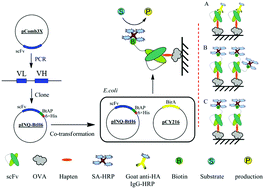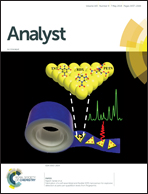Biotinylated single-chain variable fragment-based enzyme-linked immunosorbent assay for glycocholic acid
Abstract
Glycocholic acid (GCA) has been identified as a novel selective and sensitive biomarker for hepatocellular carcinoma (HCC). In this work, a recombinant antibody, scFv-G11, which was shown previously to have selective reactivity for GCA, was labeled with biotin using a chemical and an enzymatic method, respectively. The enzymatic method proved superior giving sensitive scFv–biotin preparations. Based on biotinylated scFv against GCA and a biotin–streptavidin system for signal amplification, an indirect competitive biotin–streptavidin-amplified enzyme-linked immunosorbent assay (BA-ELISA) has been established for the sensitive and rapid detection of GCA. Several physiochemical factors that influenced assay performance, such as organic cosolvent, ionic strength, and pH, were studied. Under the optimized conditions, the indirect competitive BA-ELISA based on the obtained biotinylated scFv antibodies indicated that the average concentration required for 50% inhibition of binding (IC50) and the limit of detection (LOD) for GCA were 0.42 μg mL−1 and 0.07 μg mL−1, respectively, and the linear response range extended from 0.14 to 1.24 μg mL−1. Cross-reactivity of biotinylated scFv antibodies with various bile acid analogues was below 1.89%, except for taurocholic acid. The recoveries of GCA from urine samples via this indirect competitive BA-ELISA ranged from 108.3% to 131.5%, and correlated well with liquid chromatography-electrospray tandem mass spectrometry (LC-MS/MS), which indicated the accuracy and reliability of biotinylated scFv-based ELISA in the detection of GCA in urine samples. This study also demonstrates the broad utility of scFv for the development of highly sensitive immunoassays.



 Please wait while we load your content...
Please wait while we load your content...